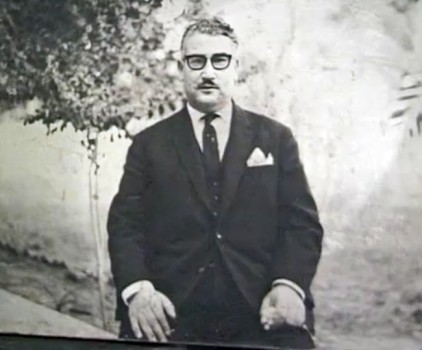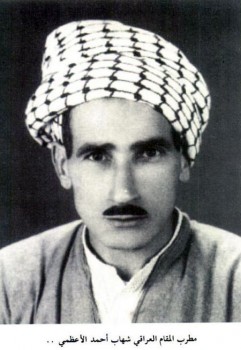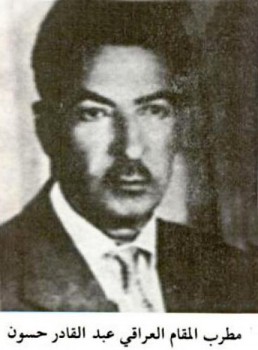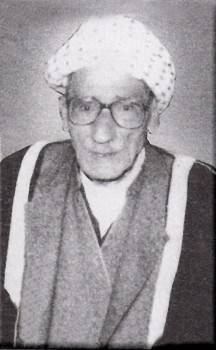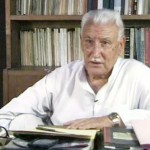The Arab Music Archiving and Research foundation (AMAR), in collaboration with the Sharjah Art Foundation (SAF), presents “Min al-Tārīkh”.
Dear listeners,
Welcome to a new episode of “Min al-Tārīkh”.
Today, we will be resuming our discussion about the disciples of al-ṭarīqa al-Qundargiyya, i.e. Rashīd al-Qundargī’s ṭarīqa, with our guest Mr. Husayn al-A‘zami.
Let us go to another period with ‘Abd al-Qādir Ḥassūn, Shihāb al-A‘ẓamī, and Ḥāj Hāshim al-Rajab.
‘Abd al-Qādir Ḥassūn is a Qundargī disciple par excellence: he displays all the characteristics of the ṭarīqa Qundargiyyia, and he even imitated Rashīd al-Qundargī’s maqām singing in a parrot-like manner.
He sang the following famous qaṣīda by al-Mutanabbī to the maqām jahārkāh:
Mā la-nā kullu-nā jawwin yā rasūlu Anā ahwa wa-qalbuka al-mabtūlu
Kulla-mā ‘āda man ba‘athtu ilayhā Ghāra minnī wa-khāna fī-mā yaqūlu
Afsadat bayna-nā al-amānāti ‘aynāhā Wa-khānat qulūbahunna al-‘uqūlu
He also sang to the maqām awj “Bi-hā ghayr ma‘dhūrun fa-dāwī khimārahā”, also sung by Aḥmad al-Zaydān. ‘Abd al-Qādir’s moving voice expressed sadness and sorrow. He sang to the maqām nawa with a style close to his teacher Rashīd al-Qundargī’s ṭarīqa…
(♩)
Now, let us talk about Shihāb Aḥmad al-A‘ẓamī (1918 – 1997) whose life I witnessed, especially towards the end, meeting with him almost every day at the Sadīr café in al-A‘ẓamiyya on the Tigris river because I was working on a research for the institute and had chosen him as one of my subjects… I felt sorry I had not known him before, especially that we came from the same place, as I discovered a great personality, despite his simple education and his modest life, a very pleasant and incredibly kind hearted person. In my book on al-ṭarīqa al-Qundargiyya, I described the great muṭrib Rashīd al-Qundargī as a reflection of his era. The same applies to muṭrib Shihāb al-A‘ẓamī who also reflected through his Iraqi maqām singing the reality of the period he lived in added to the simple education he earned and appropriated in his environment. This is illustrated in the early and late Iraqi maqām-s he recorded: he was born during the Period of Change, started off as a maqām singer during the Trial Period, and died during the Period of Maturity. Thus, his aesthetical taste and tendency in maqām singing were derived from the ṭarīqa Qundargiyya, i.e. the digest of all the old attempts in maqām performance dating back to the 19th century and that he listened to and that inspired him, and that he held on to and enjoyed until he died.
His interpretation of the maqām ibrāhīmī that he recorded is almost a perfect imitation of Rashīd al-Qundargī’s that inspired him and that he performed with mastery. This maqām induced sorrowful expressions within the soul of Shihāb al-A‘ẓamī to a point where it seems that the latter had specialised in singing this old classical maqām, singing it with might and main, talent and mastery…
(♩)
I used to talk with him about the maqām ibrāhīmī and about the other maqām-s.
He once told me that despite his great respect for Muḥammad al-Qubbāngī and his unique ṭarīqa, he was fascinated with Rashīd al-Qundargī’s ṭarīqa which he considered to be the best and most beautiful maqām singing ṭarīqa that felt closest to himself and to expressing the life of Iraqis.
He attacked some of today’s singers, considering their singing as senseless and free of authenticity or objectivity, and stated that he only wished to listen to the ancient maqām singers. This was Shihāb al-A‘ẓamī’s point of view.
I once went to meet with him at the café… He was already there, and while waiting for me, had started singing the following qaṣīda by Abū al-Nawwās to the maqām khanabāt:
Naḍat ‘an-hā al-qamīṣ li-ṣabbi mā’in Fa-warrada khadda-hā farṭu al-ḥayā’i
Wa-qābalat al-hawā’ wa-qad ta‘arrat Bi-mu‘tadilin araqqu min al-hawā’i
Wa-maddat rāḥatun k-al-mā’i min-hā Ila mā’in mu‘addin fī inā’i
Fa-lammā an qaḍat waṭran wa-hammat ‘Ala ‘ajalin li-ta’khudha bi-al-ridā’i
Ra’at shakhṣu al-raqībi ‘ala al-tadānī Fa-asbalat al-ẓalām ‘ala al-ḍiyā’i
Wa-ghāb al-ṣubḥu min-hā taḥta laylin Wa-ẓall al-mā’u yajrī fawqa mā’i
Fa-subḥān al-ilāh wa-qad barā-hā Ka-aḥsana mā takūn min al-nisā’i
I did not greet him, yet remained standing and listening to him enjoying himself. He sang the full qaṣīda to the maqām khanabāt.
Then I sat sat down and he told me that his father used to sing this maqām khanabāt, adding: “I recorded at the Baghdad Radio the same maqām khanabāt that my father sang”…
(♩)
Dear listeners,
We have reached the end of today’s episode of “Min al-Tārīkh”.
We apologise for the bad quality of some of the recordings. But as we have already explained, when a recording does not belong to AMAR where it is treated, cleaned, documented, and archived, we try to find a recording through other sources who may have collected these recordings individually, and whom we thank.
So thank you to all those who helped us in obtaining these recordings whether on the Internet or from the collections of Prof. Ahmad al-Sabki and Mr. Hamid al-Saadi.
We will meet again in a new episode to resume our discussion about al-ṭarīqa al-Qundargiyya.
We thank Mr. Husayn al-A‘zami.
“Min al-Tārīkh” is brought to you by Mustafa Said.
- 221 – Zakariyya Ahmed – 12 (1/9/2022)
- 220 – Zakariyya Ahmed – 11 (1/9/2022)
- 219 – Zakariyya Ahmed – 10 (11/25/2021)
- 218 – Zakariyya Ahmed – 9 (10/26/2021)
- 217 – Zakariyya Ahmed – 8 (9/24/2021)
- 216 – Zakariyya Ahmed – 7 (9/4/2021)
- 215 – Zakariyya Ahmed – 6 (8/28/2021)
- 214 – Zakariyya Ahmed – 5 (8/6/2021)
- 213 – Zakariyya Ahmed – 4 (6/26/2021)
- 212 – Zakariyya Ahmed – 3 (5/27/2021)
- 211 – Zakariyya Ahmed – 2 (5/1/2021)
- 210 – Zakariyya Ahmed – 1 (4/28/2021)
- 209 – W-al-Lāhi lā astaṭī‘u ṣaddak 2 (4/6/2017)
- 208 – W-al-Lāhi lā astaṭī‘u ṣaddak 1 (3/30/2017)
- 207 – Bashraf qarah baṭāq 7 (3/23/2017)

